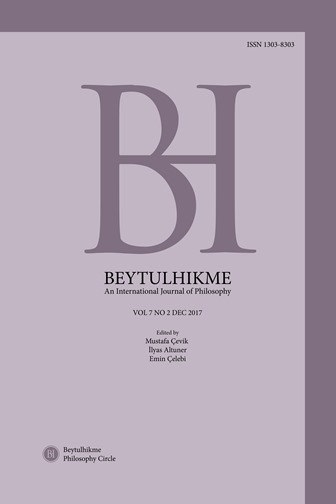Author :
Abstract
Türkiye’de Kemalizm, tek ve kesin bir tanım yapılamayan amorf yapısı ve ideolojik olmak ile dünya görüşü olmak arasında gidip gelen ikircikli hali ile basit olmaktan oldukça uzak bir siyaset felsefesi kavramı ve karmaşık bir siyaset yapma enstrümanıdır. Türk sağını inceleyen Tanıl Bora’nın kavramsallaştırmasından ilhamla, Kemalizmin katı, sıvı ve gaz hallerinden bahsedilebileceğini öne süren bu çalışma, Kemalist ideoloji, onun esas ve re’sen (sua sponta) sahibi görünen CHP ve onun mirasçısı partilerce oldukça katı bir biçimde yorumlanırken, Türk milliyetçisi ya da bazı aşırı sol kesimlerce daha sıvı bir felsefik anatema olarak yorumlandığı ileri sürülebilir. Öte yandan merkez-sağda yer alan aktörlerce de daha pratiğe yönelik, uçucu, başka akımlarla iç içe geçmiş ve gaz halde denebilecek bir Kemalizm yorumunun geliştirildiği görülmektedir. Bu çalışmada ortaya konan argümanlardan bir tanesi de, Kemalizmin üç halinin Kemalist ilkelerle geliştirdiği farklı ilişkilerdir: katı Kemalizm ilke koyucu ve Kemalizmin niteliğini tanımlayıcı olarak ortaya çıkarken; sıvı Kemalizm, tanımlanmış ilkelerden kendi ideolojik pozisyonuna uygun olanı selektif olarak öne çıkarmaktadır. Gaz haldeki Kemalizm ise Kemalizmin ilkelerine atıf yapmak yerine, Atatürk’ün manevi şahsiyetini bir ilke olarak sunmayı tercih etmektedir.
Keywords
Abstract
Swinging between being either an ideology or a worldview, Kemalism in Turkey is a complex philosophical concept of politics as well as an instrument for policy-making processes which is far from being simple, with its amorphous nature that can not be described with a clear definition. Inspired by the conceptualization of Tanıl Bora, who has been studying the Turkish right, this study suggests that it is possible to talk about Kemalism's solid, liquid and gas states, in which it is possible to argue that the CHP and its heirs apparently the essence and sua sponte possessed the Kemalist ideology, which is also interpreted as a more liquid philosophical anathema by the Turkish nationalist or some extreme left-wing ideologies. On the other hand, it appears that the center-right actors have also developed a Kemalist interpretation that is more practical, volatile, intertwined with other currents suggesting the gas phase. One of the arguments put forward in this study is the different Kemalisms have developed different relations with Kemalist principles: solid Kemalism emerges as a descriptor and identifier of the main principles of the Kemalism; liquid Kemalism is selectively highlighting what is appropriate for its ideological position from the identified principles. Instead of referring to the prevailing principles of Kemalism, Kemalism in the form of gas phase prefers to present Atatürk's spiritual personality as a principle.
Keywords
- Bahçeli, D. (2008). Yönetilemeyen Türkiye. Ankara: MHP Yayınları.
- Bora, T. (1998). Türk Sağının Üç Hali: Milliyetçilik, İslamcılık, Muhafazakarlık. İs- tanbul: İletişim Yayınları.
- Bora, T. (2017). Cereyanlar. İstanbul: İletişim Yayınları.
- CHP Parti Programı. http://www.chp.org.tr/wp-content/uploads/chpprogram.pdf. Erişim Tarihi: 17.06.2017.
- CHP Parti Programı (2013). http://www.chp.org.tr/wp- content/uploads/chpprogram.pdf. Erişim Tarihi>: 09.09.2017.
- CHP Program (1976). https://www.tbmm.gov.tr/eyayin/GAZETELER/WEB/KUTUPHANEDE% 20BULUNAN%20DIJITAL%20KAYNAKLAR/KITAPLAR/SIYASI%20 PAR- TI%20YAYINLARI/197401103%20CHP%20PROGRAMI%201976/19740 1103%20CHP%20PROGRAMI%2019760000_0284.pdf. Erişim Tarihi: 01.09.2017.
- Çeçen, A. (1998). Kemalizm. İstanbul: Çağdaş Yayınları.
- Demirel, T. (2011). Türkiye’nin Uzun On Yılı: Demokrat Parti İktidarı ve 27 Mayıs Darbesi. İstanbul: İstanbul Bilgi Üniversitesi Yayınları.
- Göle, N. (1992). Modern Mahrem: Medeniyet ve Örtünme. İstanbul: Metis Yayınları.
- Hanioğlu, Ş. (2011). The Scienticism of the Young Turks, Atatürk: An Intellectual Biography. Princeton: Princeton University Press, 48-67.
- Harris, G. (2002). Celal Bayar: Conspiratorial Democrat. Political Leaders and Democracy in Turkey (eds. M. Heper, S. Sayarı). Maryland: Lexington Books, 45-63.
- Hürriyet (2017, 10 Kasım ). Sirenler çalarken pazarda dua ettiren imama soruş- turma. http://www.hurriyet.com.tr/sirenler-calarken-pazarda-dua-ettirenimama-sor-40641341.
- Hürriyet (2017, 31 Ekim). Mustafa Armağan'a Atatürk'e hakaretten hapis cezası. http://www.hurriyet.com.tr/mustafa-armagana-ataturke-hakaretten-hapiscezasi-40629103.
- İleri, R. N. (1994). Atatürk ve Komünizm. İstanbul: Sarmal Yayınevi.
- Kahramanoğlu, İ. (2004). YÖN’ün Mirası: Tavizsiz Atatürkçülük, Tavizsiz Solcu- luk, Tavizsiz Milliyetçilik. İleri. 23 (1).
- Kandiyoti, D.A. (1987). Emancipated but Unliberated? Reflections on the Turkish Case. Feminist Studies, 13 (2), 317-338.
- Kili, S. (1980). Kemalism in Contemporary Turkey. International Political Science Review, 1 (3), 381-404.
- Mardin, Ş. (1973). Center-Periphery Relations: A Key to Turkish Politics? Daeda- lus, 102 (1), 169-190.
- Mardin, Ş. (1986). Yenileşme Dinamiğinin Temelleri ve Atatürk. Çağdaş Düşün- cenin Işığında Atatürk. Çağdaş Düşünce nin Işığında Atatürk, cilt 2 (ed. T. Z. Tunaya). İstanbul: Dr. Nejat F. Eczacıbaşı Yayınları, 21-48.
- Mevzuat Dergisi (2017). Atatürk Aleyhine İşlenen Suçlar Hakkında Kanun. http://www.mevzuat.gov.tr/MevzuatMetin/1.3.5816.pdf. Kabul Tarihi: 25.07.1951. Erişim Tarihi: 12.09.2017.
- Milliyetçi Hareket Partisi Programı (1993). Ankara: MHP Yayınları.
- Orwell, G. (2014). Hayvan Çiftliği (çev. C. Üster). İstanbul: Can Yayınları.
- Ozankaya, Ö. (1990). Türkiye’de Laiklik, Cilt 1. İstanbul: Cem Yayınevi.
- Özal, T. (1988). Ölümünün 50. Yılında Atatürk’ü Anma Toplantısı: Başbakan Sayın Turgut Özal’ın Konuşması. http://www.atam.gov.tr/dergi/sayi13/olumunun-50-yilinda-ataturku-anma-toplantisi-basbakan-sayin-turgutozalin-konusmasi. Erişim tarihi: 07.06.2017.
- Özbudun, E. (1981). The Nature of the Kemalist Regime. Atatürk: Founder of a Modern State (eds. A. Kazancıgil, E. Özbudun). London: C. Hurst and Company.
- Özbudun, E. (2000). Contemporary Turkish Politics: Challanges to Democratic Consoli- dation. Boulder, London: Lynne Rienner Publishers.
- Parla, T. (1991). Tek Parti İdeolojisi ve CHP’nin Altı Oku. İstanbul: İletişim Yayınla- rı.
- Sarı, İ. (2016). Dokuz Işık (Alparslan Türkeş): “Türk’ün Kurtuluş Reçetesi”. Antalya: Nokta E-Book Publishing.
- Shils, E. (1961). Centre and Periphery. The Logic of Personal Knowledge: Essays Presen- ted to Michael Polanyi on His Seventieth Birthday. Glencoe: Free Press, 117-130.
- Tekin, A. (2000). Alparslan Türkeş’in Liderlik Sırları. İstanbul: Okumuş Adam Yayınları.
- Ülkü Ocakları Web Sitesi. www.ulkuocaklari.org.tr. Erişim tarihi: 04.08.2017.





